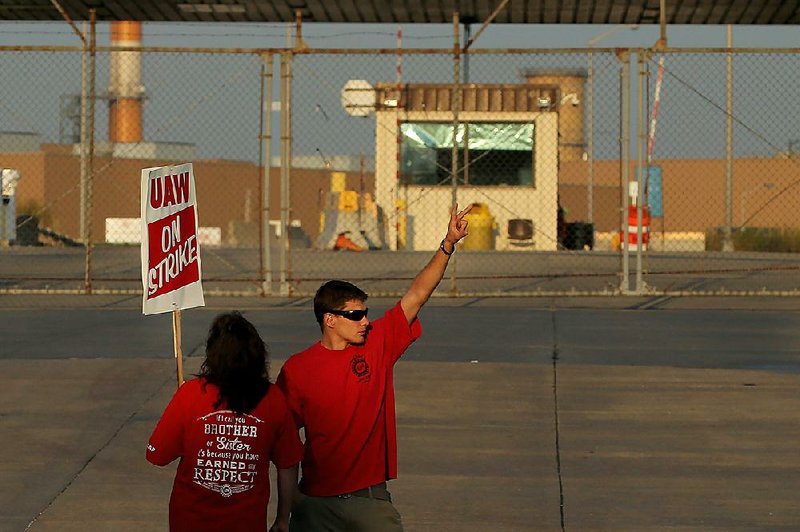DETROIT -- United Auto Workers President Gary Jones abruptly resigned Wednesday, capping a tumultuous day that saw union leaders move to oust him and General Motors accusing rival Fiat Chrysler in a lawsuit of bribing union officials to get more favorable contract terms from the UAW.
Jones has notified the union that he would retire, his attorney, Bruce Maffeo of New York, said in an email.
The news of Jones came shortly after the UAW's international executive board filed paperwork to expel him and regional director Vance Pearson from the union over allegations raised by a federal investigation into union corruption that has resulted in numerous arrests starting in 2017. The move to oust the two leaders would have led to union trials for both.
Pearson is facing criminal charges while Jones has not been charged but federal agents raided his suburban Detroit home in August.
In the email, Maffeo said Jones decided to step down before learning of the move to oust him.
Jones, who has been a UAW member for 44 years and started as a factory worker, stepped down to let the union focus on its core mission of improving the lives of members and their families, Maffeo said.
Pearson's status with the union was not clear late Wednesday. A message was left seeking comment from his attorney.
Jones' departure came just hours after General Motors filed a racketeering lawsuit against Fiat Chrysler, alleging that its crosstown rival got an unfair business advantage by bribing UAW officials.
The unprecedented lawsuit, filed Wednesday in U.S. District Court in Detroit, alleges that Fiat Chrysler was involved in racketeering by paying millions in bribes to get concessions and gain advantages in three labor agreements with the union.
The lawsuit alleges that Fiat Chrysler corrupted the bargaining process with the UAW in the 2009, 2011 and 2015 union contracts to gain advantages over General Motors.
"[Fiat Chrysler] was the clear sponsor of pervasive wrongdoing, paying millions of dollars in bribes to obtain concessions" from the union, said Craig Glidden, GM's general counsel. "[Fiat Chrysler's] manipulation of the collective bargaining process resulted in unfair labor costs and operational advantages for it, causing harm to GM."
In a statement, Fiat Chrysler called the lawsuit "meritless" and said it would defend itself vigorously. It also accused GM of trying to disrupt its proposed merger with French automaker PSA Peugeot as well as ongoing contract talks with the UAW.
"We are astonished by this filing, both its content and its timing," Fiat Chrysler said. "We intend to vigorously defend against this meritless lawsuit and pursue all legal remedies in response to it."
Glidden alleged that Fiat Chrysler CEO Sergio Marchionne, who died last year, was a "central figure" in the conspiracy, which was designed to put GM at a cost disadvantage to Fiat Chrysler.
Erik Gordon, a University of Michigan business and law professor, said one company suing another over bribes to union officials is without precedent.
In addition to Fiat Chrysler, GM's lawsuit names former Fiat Chrysler labor relations chief Alphons Iacobelli, and former Fiat Chrysler officials Jerome Durden and Michael Brown as defendants. All have pleaded guilty in the federal corruption investigation, which has alleged that Fiat Chrysler bribed UAW officials to keep them "fat, dumb and happy."
Authorities have said that payments were made through a training center jointly run by the company and the UAW. Durden handled the training center's finances, and Brown helped run the center.
After leaving Fiat Chrysler, Iacobelli went to GM's labor relations department in 2016. He was suspended after his indictment and fired in December of 2017.
In a separate statement, the UAW said it had safeguards in place to ensure the integrity of its contracts negotiated with Fiat Chrysler, including reviews by local and international union officials.
"We are confident that the terms of those contracts were not affected by Iacobelli's misconduct, nor that of any UAW officials involved in the misuse of joint program funds at [Fiat Chrysler]," the statement said.
The UAW says it's committed to make whatever changes are needed to make sure misconduct never happens again.
Glidden told reporters that in the three UAW contracts, Fiat Chrysler was able to reduce its labor costs because the union allowed it to hire more temporary and lower-paid workers than GM.
In 2007, the union agreed that new hires would be paid less than longtime workers, setting up a "second-tier" of employees who were paid less. Fiat Chrysler has more second-tier workers than either of its Detroit competitors.
The Center for Auto Research, an industry think tank, calculated earlier this year that Fiat Chrysler's total labor costs including wages and benefits were about $55 per hour, giving it an $8-per-hour benefit over GM and a $6 advantage over Ford.
Glidden said GM is not suing the UAW because it believes that responsibility rests with Fiat Chrysler, which was the "orchestrator" of the conspiracy.
He said GM is seeking substantial damages in the case, but he could not give a specific amount. The lawsuit says GM doesn't seek to reduce wages or benefits for any UAW workers.
Last month, the union settled with GM after a 40-day strike, and Ford workers reached an agreement shortly after. Intense talks with Fiat Chrysler began Monday, with the possibility of another strike partly because union members distrust the UAW leadership.
Business on 11/21/2019

